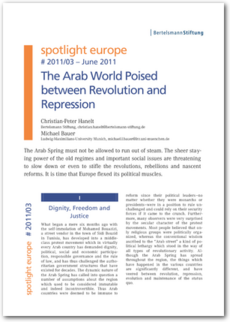Dignity, Freedom and Justice
What began a mere six months ago with the self-immolation of Mohamed Bouazizi, a street vendor in the town of Sidi Bouzid in Tunisia, has developed into a middle-class protest movement which in virtually every Arab country has demanded dignity, political, social and economic participa-tion, responsible governance and the rule of law, and has thus challenged the autho-ritarian government structures that have existed for decades. The dynamic nature of the Arab Spring has called into question a number of assumptions about the region which used to be considered immutable and indeed incontrovertible. Thus Arab countries were deemed to be immune to reform since their political leaders—no matter whether they were monarchs or presidents—were in a position to rule un-challenged and could rely on their security forces if it came to the crunch. Further-more, many observers were very surprised by the secular character of the protest movements. Most people believed that on-ly religious groups were politically orga-nized, whereas the conventional wisdom ascribed to the "Arab street" a kind of po-litical lethargy which stood in the way of all types of revolutionary activity. Al-though the Arab Spring has spread throughout the region, the things which have happened in the various countries are significantly different, and have veered between revolution, repression, evolution and maintenance of the status quo.



